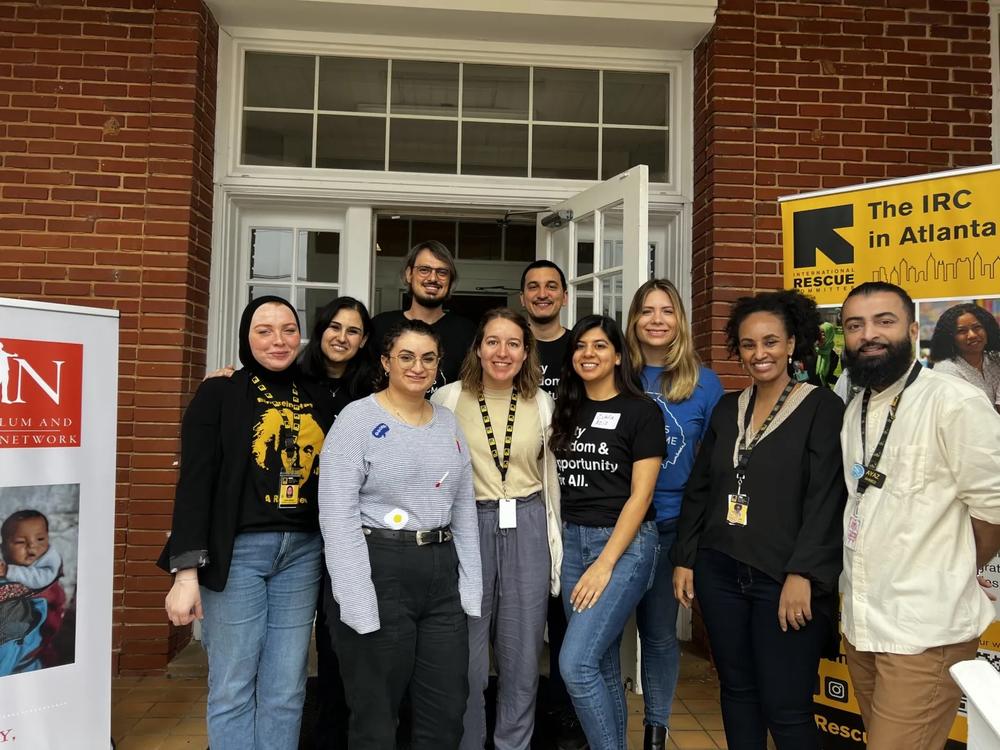
Caption
Staff from the IRC in Atlanta and GAIN at a February 2023 TPS Clinic in Clarkston, Ga.
Credit: Courtesy of GAIN

Staff from the IRC in Atlanta and GAIN at a February 2023 TPS Clinic in Clarkston, Ga.
Abdul Malik Sadat, an Afghan evacuee welcomed to the U.S. two years ago with his wife, may lose his property maintenance job because of challenges stemming from his temporary immigration status.
“I like my job,” Sadat explained through an interpreter. “I would like to work to support my family,” which now includes an 11-month-old daughter.
Over the past two years, the International Rescue Committee (IRC) in Atlanta has resettled 800 Afghan evacuees who came through Operation Allies Welcome after the U.S. troop withdrawal from Afghanistan. These Afghan allies are eager to rebuild their lives here but their “humanitarian parole” status only lets them to stay for two years at a time and doesn’t provide a path to lawful permanent residence.
“This temporary status has stunted the integration our clients could have because they are constantly worried about their status,” said Asiyah Sarwari, Managing Attorney with IRC in Atlanta.
“We applied for Sadat’s work authorization and Temporary Protected Status (TPS) but have received no response,” said Fetratullah Farhat, IRC in Atlanta Immigration Legal Specialist. Sadat is also in the process of filing asylum and parole extension applications.
To help families like Sadat’s navigate all of this, the IRC in Atlanta partnered with the Georgia Asylum & Immigration Network (GAIN). Together the nonprofits hosted 12 pro se legal clinics and assisted nearly 600 Afghan humanitarian parolees filing for asylum and/or TPS.
“We played to our respective strengths,” said Adriana Heffley, GAIN Director of Legal Services. “We have extensive asylum expertise established over the past 18 years and IRC has this incredible staff, resources, space and case management services.”
This summer, the Biden administration authorized re-parole for Afghan evacuees but even this band-aid is fraught with complications.
“Even though the USCIS [U.S. Citizenship and Immigration Services] offers guidance it’s not trickling down to the employers,” Sawari said.
“The approval notice functions as an extension of their work authorization,” Heffley said. “That’s new to employers and some won’t accept it.” A separate work permit application takes time.
And when USCIS fails to update approved Afghan parolees’ status online, parolees often can’t renew their driver’s license.
“I have a client who is a truck driver,” Farhat said. “His license expired. DDS didn’t renew it. He is now at home and concerned how to pay his rent.”
Submitting application after application also requires Afghan refugees to relive and report difficult experiences.
“Especially for the military folks who provided support to the U.S. and have PTSD, applying for these different statuses could potentially retraumatize them,” said Zuhra Aziz, Esq., GAIN Equal Justice Works Fellow.
There is a common sense solution with precedent. After previous U.S. troop withdrawals, like after the Vietnam War, Congress passed adjustment acts to provide a path to lawful permanent residence for those evacuated.
The bipartisan Afghan Adjustment Act of 2023 reintroduced this summer provides a path to permanent status for Afghan evacuees with additional vetting and improves efforts to protect Afghans left behind.
“The asylum process is a lengthy process… which might take years. The Afghan Adjustment Act will provide an immediate solution,” explained Lina Jarour, LL.M., IRC in Atlanta Legal Representative.
Asylum approval rates in Georgia are also some of the lowest in the nation. So far, only 18 IRC-GAIN clinic clients have been granted asylum. One of the first was a mother and young son.
“She is a minority targeted by the Taliban,” Jarour said. “She cannot read or write. She did not want that for her son. Now his English is really good, and he helps his mother.”
The Afghan Adjustment Act would relieve pressure on a population eager to live peacefully in the U.S.
“We know this group would be targeted if they are forced to return to Afghanistan,” Heffley said. “So many wouldn’t be safe or be able to live a full life if they went back, especially women and girls.”
“There’s strong bipartisan support,” Sarwari said. “There is no reason not to pass it. The alternative is to have a huge group of people at some time in the future have no status — nobody wants that.”
For more information about the Afghan Adjustment Act, visit this link. Learn more about IRC in Atlanta at rescue.org/atlanta and GAIN at georgiaasylum.org.
This story comes to GPB through a reporting partnership with Rough Draft Atlanta.